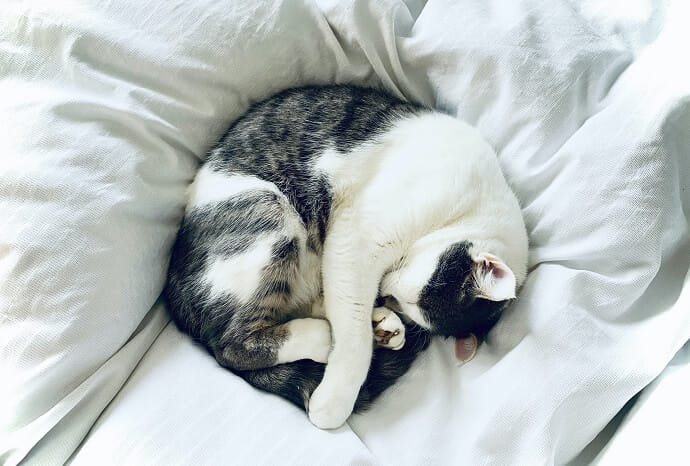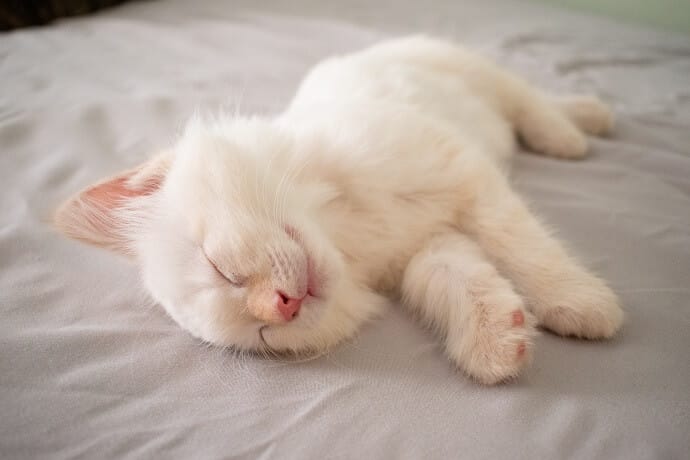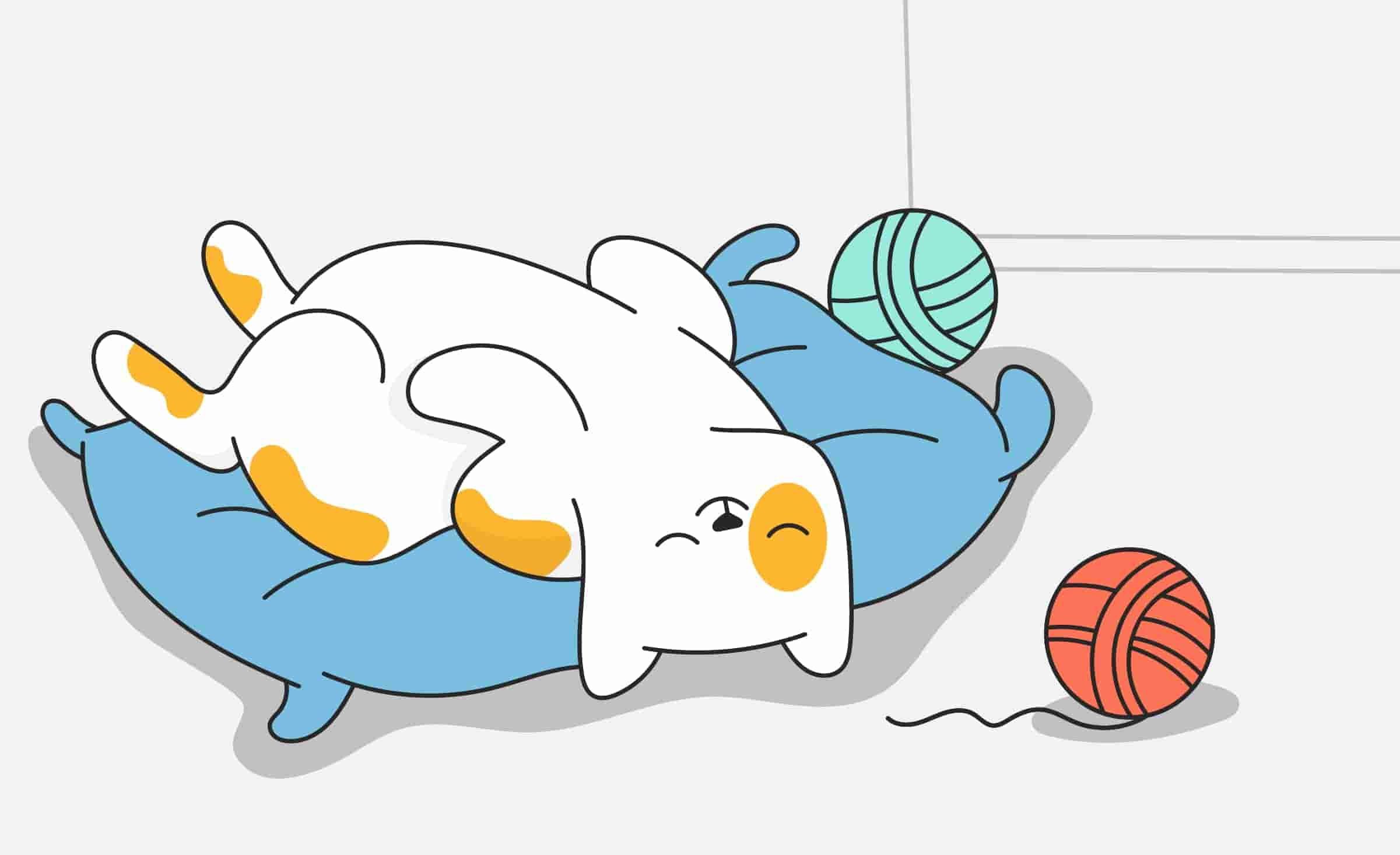Many more of us have been working from home recently, much to the annoyance of our feline friends whose style we are now most certainly cramping. Being around your cat all day, it may have become more apparent to you that your cat seems to sleep an awful lot.

I mean, we always knew that cats love a good nap (hence, catnap). We fully expected a quietly purring presence asleep on any available surface in the house when we brought the little fluffsters home for the first time. We expected them to sleep a lot. But this much?
Why do cats sleep so much? How can we tell what’s normal and what’s excessive? When does your cat sleeping a lot become too much? Let’s answer these and other most common questions about cats’ sleep patterns.
How much sleep do cats need?
“Every time I look at her she’s fast asleep. How much do cats sleep?”
Cats sleep on average between 15 and 20 hours a day. This might seem excessive, but it’s a common trait among all cats.
Cats are essentially built for bursts of activity, not sustained action. In the wild, large cats like lions and leopards, spend a lot of their time resting and recharging for the hunt. All their stored energy is poured into the pursuit of their prey.
Prey species are usually less active in the heat of the day and at night when visibility is bad. So, dawn and dusk are prime hunting times, and these big cats need to be well-rested and fully focussed to make the most of this brief window.
Your domesticated cat may receive its meals effortlessly delivered at set times every day instead of hunting for them, but this instinct is hardwired into the cat’s nature. So, you should see that your kitty is more active at around dawn and dusk each day.
“I was told cats are mostly awake at night. Are cats nocturnal?”
It’s not 100% accurate to say that cats are nocturnal. They are, in fact, crepuscular, which is a sciency way of saying they prefer being more active during the dawn and dusk hours.
This will explain why your sweetly sleeping toes are most at risk of being savaged by your cat at around 3 or 4 am. And attacking things, chasing after them, pouncing? This all takes a tremendous amount of energy.
So, with around 4 to 9 hours of your cat’s day occupied with eating, grooming, and playing/attacking, the remaining 15 to 20 hours are dedicated to deeply recharging. Cats are masters of energy efficiency.
You might also be pleased to know that cats are able to adjust their sleep schedule slightly to yours (and their mealtimes), so over time will turn in at night when you do, and not wake up too early in the morning.
“How can I get my kitty to sleep at night?”
If your cat is waking you up at night or in the early hours on a regular basis, there are ways to gently train them to stop. If your cat is healthy, well-fed, and well stimulated there should be no reason for them to wake you up.
- Establish a solid daily routine of play and feeding times. Cats are creatures of habit and will thrive on a stable routine.
- A thorough play session before bed followed by a tasty treat should leave them tired enough to sleep through the night.
- If your cat is just looking to play or for attention, try not to react — this will only encourage them to keep waking you up.
If there’s a sudden change in your cat’s behavior it’s always best to check in with the vet to make sure it isn’t something more serious.
“My cat sleeps all day — is this normal?”
Absolutely. First-time cat owners are usually quite shocked when their new companion sleeps all day and then chooses to explore their home in the small hours of the morning, robbing them of precious sleep in the process. Once you’re properly awake and your cat has enjoyed their breakfast, they politely curl up and fall fast asleep while you’re left facing your busy day on minimal sleep.
Cats will sleep most of the day, and then, come twilight will become more active again. They’ll be napping again by the early evening and will likely be asleep before you’re finished your dinner, sometimes waking for some late night shenanigans as you’re getting ready for bed.
How much do kittens sleep?
“Why is my kitten sleeping so much? I thought she’d be more active.”
Age plays an important role in how much sleep your cat needs. Kittens will most likely require more sleep as they are also devoting a lot of energy to getting bigger physically.

It’s common to assume that curious little kittens would be much more active, when in fact they’re super sleepy. Growing and learning all about their world is exhausting and your kitten will need their rest. There’s no need to worry if you notice your kitten sleeping all day long.
As cats get older, they will be awake for more hours in the day, returning to sleepier ways in their old age.
How do I know if my cat is sleeping too much?
“How long do cats sleep? How do I know what’s normal?”
Cats have 2 sleep modes: deep sleep and dozing.
When your cat is dozing, it’s usually a light sleep. Their eyes are closed, but their ears are moving in relation to any noises around them. They may open their eyes briefly to assess the situation, but they’re not awake as such.
In a doze, your cat’s paws are likely tucked in, or they’re in a position from which it’s easy to spring into action. This sort of sleep can last 15 to 30 minutes and makes up most of your cat’s days.
Deep sleep is a much shorter cycle of sleep. Because cats in the wild need to be alert to avoid threats, the deep sleep cycle only lasts around 5 minutes. At this time your cat is most vulnerable, so try not to startle them.
You can spot when your cat is in a deep sleep by the fully relaxed body position, dreaming, paw twitches, and occasional snores. Common positions in deep sleep resemble advanced yoga poses and look incredibly uncomfortable.
These two sleep states will cycle repeatedly for as long as the cat feels they need to sleep. Usually, a good few hours at a time.
Some cat breeds are notoriously sleepier than others. For example, Maine Coons, Persians, Ragdolls, and Russian Blues are all known for being so chilled out they frequently nod off altogether.
But breed alone won’t tell you how much sleep is normal for your cat. This is something you’ll need to observe over time, and should this change drastically or suddenly, you can intervene.
“My cat is sleeping more than usual. Should I worry?”
Not necessarily. Cats’ sleeping patterns can vary in relation to things like the weather. You might notice that on cold, rainy days, your cat (much like you) wants nothing more than to curl up somewhere snug and snooze.
But a very sudden and drastic change in your cat’s behavior should be cause for concern. Err on the side of caution always, and pop in at the vet for a check.
“Is my cat sleeping too much?”
So, when should you worry if your cat is sleeping more than usual? It can be hard to tell if your cat is sleeping longer hours since cats sleep so much to start with. But if you notice that your cat is no longer playful at their regular times, it might be time to investigate further.
It’s important to ensure that your cat isn’t simply sleeping because she’s bored and have nothing else to do. If your cat has plenty of playtime and stimulation throughout the waking hours, then you shouldn’t worry. Dedicate a portion of every day to giving your kitties a thorough workout through play to be sure they aren’t under-stimulated.
In addition to boredom, other reasons your cat might be sleeping too much include diabetes, arthritis, issues with diet and a potential lack of vitamins, obesity, and feline depression.
Symptoms that your cat is unwell usually don’t occur in isolation, so check for other subtle signs that your cat may be unwell. Signs can include your cat having difficulty getting up or laying down again, changes in appetite, changes in weight, changes in toilet behavior, lack of grooming, and aggression, to name a few.
Knowing what’s normal for your cat is extremely important. This way you’ll be more aware of any sudden changes or deviations and react in good time.
If you are at all concerned, it’s always best to get it checked out. Regular check-ups with your vet will help you to know the health status of your furry companion and are a great time for you to ask your vet any questions you might have about your cat’s sleep patterns.
Was this article helpful?
Help us make our articles even better









